(完整)外研版七年级下册一般过去时讲解与练习试题
外研版英语英语一般过去时试题和答案含答案解析
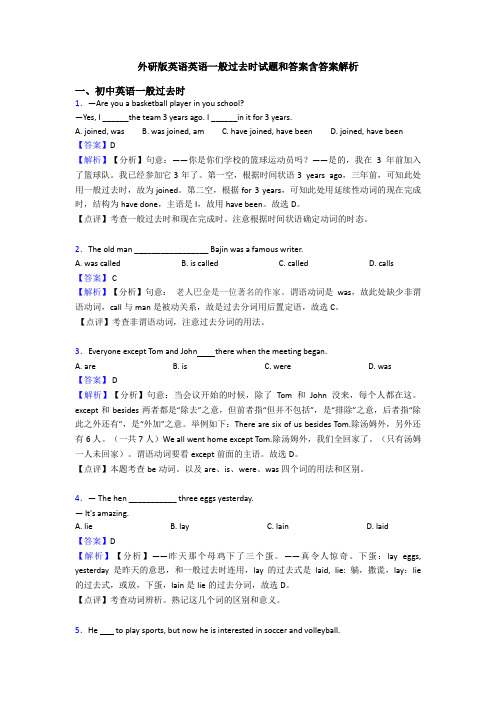
外研版英语英语一般过去时试题和答案含答案解析一、初中英语一般过去时1.—Are you a basketball player in you school?—Yes, I ______the team 3 years ago. I ______in it for 3 years.A. joined, wasB. was joined, amC. have joined, have beenD. joined, have been【答案】D【解析】【分析】句意:——你是你们学校的篮球运动员吗?——是的,我在3年前加入了篮球队。
我已经参加它3年了。
第一空,根据时间状语3 years ago,三年前,可知此处用一般过去时,故为joined。
第二空,根据for 3 years,可知此处用延续性动词的现在完成时,结构为have done,主语是I,故用have been。
故选D。
【点评】考查一般过去时和现在完成时。
注意根据时间状语确定动词的时态。
2.The old man _________________ Bajin was a famous writer.A. was calledB. is calledC. calledD. calls【答案】 C【解析】【分析】句意:老人巴金是一位著名的作家。
谓语动词是was,故此处缺少非谓语动词,call与man是被动关系,故是过去分词用后置定语,故选C。
【点评】考查非谓语动词,注意过去分词的用法。
3.Everyone except Tom and John there when the meeting began.A. areB. isC. wereD. was【答案】 D【解析】【分析】句意:当会议开始的时候,除了Tom和John没来,每个人都在这。
except和besides两者都是“除去”之意,但前者指“但并不包括”,是“排除”之意,后者指“除此之外还有”,是“外加”之意。
外研版英语英语一般过去时专项练习题及答案详解含答案

外研版英语英语一般过去时专项练习题及答案详解含答案一、初中英语一般过去时1.John and I ________ to visit his grandparents last Sunday afternoon.A. goB. wentC. will goD. have gone【答案】 B【解析】【分析】考查动词时态。
根据last Sunday知道用一般过去时,故选B。
2.—I know you ______ to China many years ago. And how long have you ______ in China ?—I don't remember it exactly.A. come, liveB. came; comeC. come; comeD. came; lived【答案】D【解析】【分析】句意:—我知道你多年前就来中国了。
你在中国住了多久了?—我记不太清了。
根据过去时间短语many years ago可知,谓语动词使用过去式came。
how long与持续性动词连用,live是持续性动词,come暂时性动词。
根据语境可知,本句为现在完成时态,所以动词使用过去分词lived。
故选:D。
【点评】此题考查一般过去时和现在完成时的用法。
3.—Could you ______ me your bike? Mine is broken.—Sorry. Tony ______ it yesterday.A. borrow ; lentB. borrow ; has lentC. lend ; borrowedD. lend ; has borrowed 【答案】 C【解析】【分析】句意:——你能借给我你的自行车吗?我的坏了。
——对不起,Tony昨天借走了。
借给,lend,借走,borrow,排除A、B。
yesterday表明时态是一般过去时,所以borrow用过去式borrowed,故选C。
外研版七年级下册语法 一般过去时讲解与练

外研版七年级下册语法一般过去时讲解与练习(一)谓语动词构成形式:主语+动词过去时+其他(二)表示过去某时发生的动作或状态(三)标志词:yesterday, just now, …ago, this morning, when I was young, last…等(四)动词过去式变化规律:1、规则变化:1)一般动词结尾加-ed, 如. walk--walked 2)以字母e结尾的动词加- d, 如. live--lived3)以辅音字母加y结尾的变y为i加-ed, 如. hurry—hurried4)以辅音字母+元音字母+辅音字母结尾的重读闭音节,双写末尾辅音字母加-ed, 如. stop –stopped2、不规则变化表1) am/is --- was 是(单)2) are --- were 是(复)3) become --- became 成为4) begin --- began 开始5) bring --- brought 带来6) build --- built 修建7) buy --- bought 买8) can --- could 能够9) come --- came 来10) cut --- cut 剪11) do/does --- did 做12) draw --- drew 画画13) drink --- drank 喝14) eat --- ate 吃15) feel --- felt 感觉16) fight --fought 打架17) find --- found 找到18) forget -- forgot 忘记19) get -- got 得到20) give --- gave 给21) go --went 去22) have/has --- had 做;进行23) hear --- heard 听见24) keep --- kept 保持25) know --- knew 知道26) learn --- learned, learnt 学习27) leave --- left 离开28) lie --- lay, lied 平卧29) let --- let 让30) lose --- lost 丢失31) make --- made 制作32) may --- might 可能33) mean --- meant 表…意思34) meet --- met 遇见35) pay --- paid 付钱36) put --- put 摆;放37) read ---read 阅读38) ride --- rode 骑(车)39) run --- ran 跑40) say --- said 说41) see --- saw 看见42) sell --- sold 卖;出售43) send --- sent 发送44) show --- showed 展示45) sing --- sang 唱歌46) sit --- sat 坐47) sleep --- slept 睡觉48) speak --- spoke 说话49) spell --- spelled, spelt 拼写50) spend --- spent 度过51) stand --- stood 站立52) swim --- swam 游泳53) take --- took 带走54) teach --- taught 教55) tell --- told 讲56) think --- thought 思考;想57) wear --- wore 穿58) write --- wrote 写3、巧记不规则动词过去式1、中间去e末尾加t,如:keep→kept,feel→felt,sleep→slept,sweep→swept 2、结尾d变t,如:build→built,lend→lent,send→sent,spend→spent3、遇见i改为a,如:ring→rang,sit→sat,drink→drank,sing→sang,swim→swam,begin→began,give→gave 4、―骑(马)‖―开(车)‖―写(字)‖——把i变o 如:ride→rode,drive→drove,write→wrote5、―想‖―买‖―带来‖―打仗‖——ought换上,如:think→thought,buy→bought,bring →brought,fight→fought6、―教书‖―抓住‖——aught切莫忘,如:teach→taught,carry →caught7、ow/aw改为ew是新时尚,如:know→knew,grow→grew,throw→threw,draw→drew8、―放‖―让‖―读‖过去式与原形一个样,如:put→put,let→let,read→read/red/ (五)否定句:1、动词be过去式后直接加notEg. I was not in Chengdu last year.2、当是实义动词时,加助动词didn’t后跟动词原形Eg. I didn’t telephone my parents yesterday.(六)一般疑问句:1、动词be过去式提前Eg. Were you in Chengdu last year?2、当是实义动词时将助动词did 放在前面,后跟主语和动词原形Eg. Did you telephone my parents yesterday? (七)特殊疑问句:特殊疑问词+一般疑问句练习:I:将下列动词变为过去式(规则动词和不规则动词)1.look2.live3.stop4.carry5.hope6.trip7.call8.finish9.want 10.are 11.go 12.have 13.do 14.get e 16.say 17.see 18.put 19.eat 20.take 21.read 22.catch 23.listen 24.arrive 25.plan II:句型转换1、他曾是一名学生。
外研版英语七年级英语∶英语一般过去时专练及解析
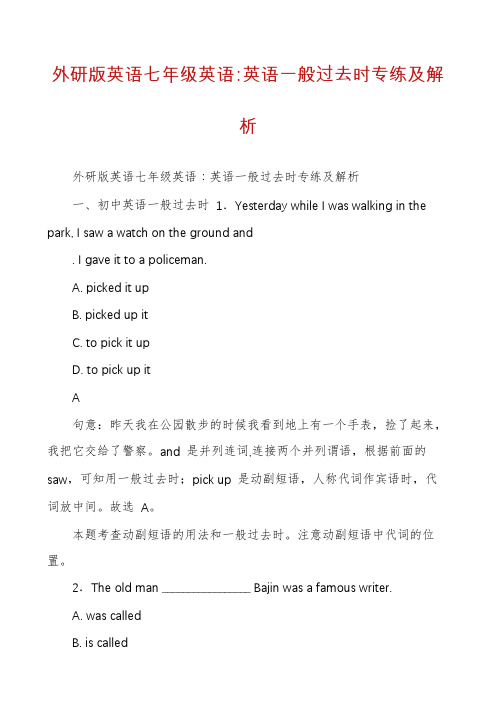
外研版英语七年级英语∶英语一般过去时专练及解析外研版英语七年级英语∶英语一般过去时专练及解析一、初中英语一般过去时1.Yesterday while I was walking in the park, I saw a watch on the ground and. I gave it to a policeman.A. picked it upB. picked up itC. to pick it upD. to pick up itA句意:昨天我在公园散步的时候我看到地上有一个手表,捡了起来,我把它交给了警察。
and 是并列连词,连接两个并列谓语,根据前面的saw,可知用一般过去时;pick up 是动副短语,人称代词作宾语时,代词放中间。
故选A。
本题考查动副短语的用法和一般过去时。
注意动副短语中代词的位置。
2.The old man _________________ Bajin was a famous writer.A. was calledB. is calledC. calledD. callsC句意:老人巴金是一位著名的作家。
谓语动词是was,故此处缺少非谓语动词,call 与man 是被动关系,故是过去分词用后置定语,故选C。
考查非谓语动词,注意过去分词的用法。
3.After Steven sent some e-mails ,he______ surfing the Internet.A. startsB. has startedC. will startD.startedD句意:Steven 发了一些电子邮件之后,他就开始上网冲浪。
start 开始,是一个动词。
根据句意和上句话中Steven sent some e-mails 可知,这里应该用一般过去时。
故选D。
A 是一般现在时;B 是现在完成时;C 是一般将来时。
考查动词时态。
4.Heto play sports, but now he is interested in soccer and volleyball.A. doesn“t useB. wasn"t usedC. didn"t useD. didn"t usedC句意:他______做运动,但是现在他对足球和排球很感兴趣。
(完整word版)外研版七年级下期末一般过去时复习

一般过去时复习He was at home yesterday.I got up at six thirty yesterday morning.I visited my aunt last weekend.2、表示过去经常或反复发生的动作。
My father often went to work by bus last year.When I was a child, I often listened to music.常与一般过去时态连用的时间有:yesterday, the other day, just now ,last night (week, month, year…) two days ago, a week ago, three years ago…(如:in 1990),from 1970 to 1980动词的过去时:+ be动词的过去式(was, were)+其他.否定句:主语+ be动词的过去式(was, were)+ not +其他.疑问句:Be 动词的过去式(was, were)+主语+其他?肯定回答:主语+ was/were . 否定:主语+wasn't/weren't.例如:He was busy yesterday.否定句:疑问句:肯定回答:. 否定:.练习:用be动词的适当形式填空1.I ______ at school just now.2.He ______ at home last week.3.We _________ students two years ago.4.There ______ an apple tree in front of my house before .行为动词的过去时:+ 行为动词的过去式+其他.否定句:主语+didn’t + V原型+其他.疑问句:Did +主语+V原型+其他?肯定回答:主语+did 否定:主语+didn’t例如:He walked to school yesterday.否定句:疑问句:. 否定:.动词过去式的小结(规则变化)edwalk—listen —look—2.以不发音字母“e”为结尾的动词后加- d live—notice—decide —3.以辅音字母加-y结尾的动词,变y为i,再加-ed. hurry—carry—cry—try—4.以重读闭音节结尾的动词,先双写后面辅音字母,再加-ed.step—动词过去式中ed 发音:组成英文的多样化。
七年级下册一般过去时讲解及练习题(完整资料).doc
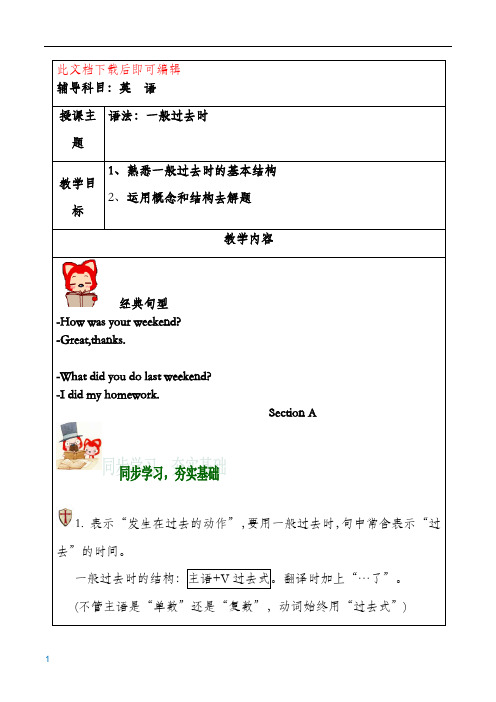
此文档下载后即可编辑辅导科目:英语授课主题语法:一般过去时教学目标1、熟悉一般过去时的基本结构2、运用概念和结构去解题教学内容经典句型-How was your weekend?-Great,thanks.-What did you do last weekend?-I did my homework.Section A1. 表示“发生在过去的动作”,要用一般过去时,句中常含表示“过去”的时间。
一般过去时的结构:主语+V过去式。
翻译时加上“…了”。
(不管主语是“单数”还是“复数”,动词始终用“过去式”)练:(1) He _________ (go) to school on foot yesterday.(2) – What did Jim do?-- He _________ (go) to the movies.(3) We ___________ (not go) to the cinema last Sunday.2. –你上个周末做了什么?-- What did you do last weekend? (did 引导,动词还原)--在星期天上午,我打了网球。
-- I played tennis on Sunday morning.拓展:时间前的介词用什么在上午/下午/晚上:in the morning/afternoon/evening在星期天上午/下午/晚上:on Sunday morning/afternoon/evening 在上个星期天上午:/ last Sunday morning (前不用冠词)在上学的白天/晚上:on school days/nightson weekends 在周末on weekdays 在工作日3. –Tina的周末怎么样?-- How was Tina’s weekend?--它很棒:It was great.–它还不错:It was not bad.–它很糟糕:It was terrible.。
外研版英语英语一般过去时形式讲解及答案解析
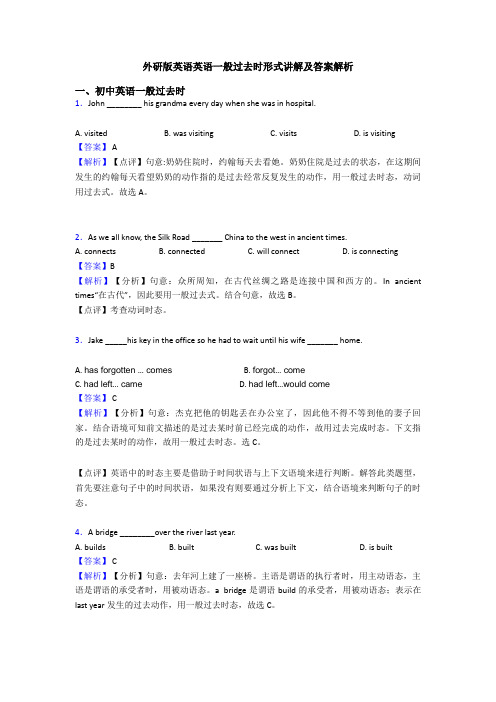
外研版英语英语一般过去时形式讲解及答案解析一、初中英语一般过去时1.John ________ his grandma every day when she was in hospital.A. visitedB. was visitingC. visitsD. is visiting【答案】 A【解析】【点评】句意:奶奶住院时,约翰每天去看她。
奶奶住院是过去的状态,在这期间发生的约翰每天看望奶奶的动作指的是过去经常反复发生的动作,用一般过去时态,动词用过去式。
故选A。
2.As we all know, the Silk Road _______ China to the west in ancient times.A. connectsB. connectedC. will connectD. is connecting【答案】B【解析】【分析】句意:众所周知,在古代丝绸之路是连接中国和西方的。
In ancient times“在古代”,因此要用一般过去式。
结合句意,故选B。
【点评】考查动词时态。
3.Jake _____his key in the office so he had to wait until his wife _______ home.A. has forgotten … comesB. forgot… comeC. had left… cameD. had left…would come【答案】 C【解析】【分析】句意:杰克把他的钥匙丢在办公室了,因此他不得不等到他的妻子回家。
结合语境可知前文描述的是过去某时前已经完成的动作,故用过去完成时态。
下文指的是过去某时的动作,故用一般过去时态。
选C。
【点评】英语中的时态主要是借助于时间状语与上下文语境来进行判断。
解答此类题型,首先要注意句子中的时间状语,如果没有则要通过分析上下文,结合语境来判断句子的时态。
4.A bridge ________over the river last year.A. buildsB. builtC. was builtD. is built【答案】 C【解析】【分析】句意:去年河上建了一座桥。
外研版英语初一年级英语英语一般过去时知识点及答案解析百度文库
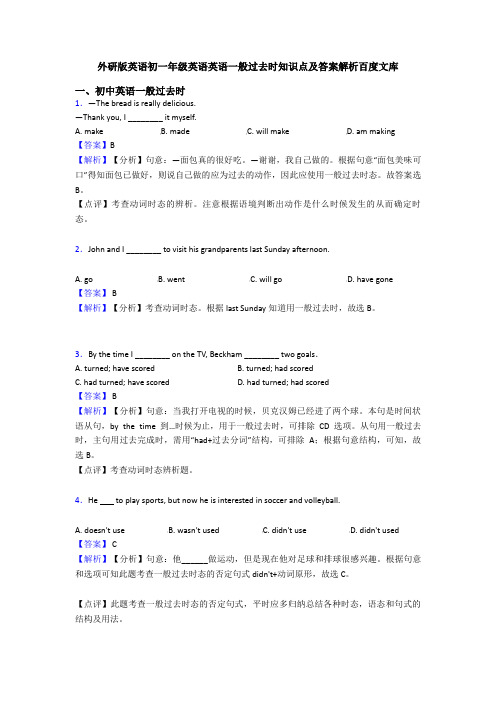
外研版英语初一年级英语英语一般过去时知识点及答案解析百度文库一、初中英语一般过去时1.—The bread is really delicious.—Thank you, I ________ it myself.A. makeB. madeC. will makeD. am making【答案】B【解析】【分析】句意:—面包真的很好吃。
—谢谢,我自己做的。
根据句意“面包美味可口”得知面包已做好,则说自己做的应为过去的动作,因此应使用一般过去时态。
故答案选B。
【点评】考查动词时态的辨析。
注意根据语境判断出动作是什么时候发生的从而确定时态。
2.John and I ________ to visit his grandparents last Sunday afternoon.A. goB. wentC. will goD. have gone【答案】 B【解析】【分析】考查动词时态。
根据last Sunday知道用一般过去时,故选B。
3.By the time I ________ on the TV, Beckham ________ two goals.A. turned; have scoredB. turned; had scoredC. had turned; have scoredD. had turned; had scored【答案】 B【解析】【分析】句意:当我打开电视的时候,贝克汉姆已经进了两个球。
本句是时间状语从句,by the time到…时候为止,用于一般过去时,可排除CD选项。
从句用一般过去时,主句用过去完成时,需用“had+过去分词”结构,可排除A;根据句意结构,可知,故选B。
【点评】考查动词时态辨析题。
4.He to play sports, but now he is interested in soccer and volleyball.A. doesn't useB. wasn't usedC. didn't useD. didn't used【答案】 C【解析】【分析】句意:他______做运动,但是现在他对足球和排球很感兴趣。
完整)外研版七年级下册一般过去时讲解与练习试题
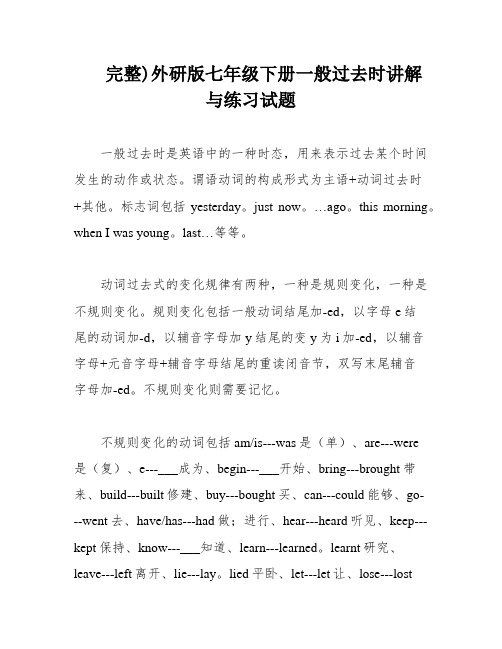
完整)外研版七年级下册一般过去时讲解与练习试题一般过去时是英语中的一种时态,用来表示过去某个时间发生的动作或状态。
谓语动词的构成形式为主语+动词过去时+其他。
标志词包括yesterday。
just now。
…ago。
this morning。
when I was young。
last…等等。
动词过去式的变化规律有两种,一种是规则变化,一种是不规则变化。
规则变化包括一般动词结尾加-ed,以字母e结尾的动词加-d,以辅音字母加y结尾的变y为i加-ed,以辅音字母+元音字母+辅音字母结尾的重读闭音节,双写末尾辅音字母加-ed。
不规则变化则需要记忆。
不规则变化的动词包括am/is---was是(单)、are---were是(复)、e---___成为、begin---___开始、bring---brought带来、build---built修建、buy---bought买、can---could能够、go---went去、have/has---had做;进行、hear---heard听见、keep---kept保持、know---___知道、learn---learned。
learnt研究、leave---left离开、lie---lay。
lied平卧、let---let让、lose---lost丢失、make---made制作、may---might可能、mean---meant 表…意思、meet---met遇见、pay---paid付钱、put---put摆;放、see---saw看见、sell---sold卖;出售、send---sent发送、show---showed展示、sing---sang唱歌、sit---sat坐、sleep---slept睡觉。
总之,学好一般过去时需要掌握动词的变化规律和不规则动词的记忆。
通过不断的练,我们可以更好地掌握这个时态,提高我们的英语水平。
___ using words。
外研版七年级下册一般过去时讲解与练习
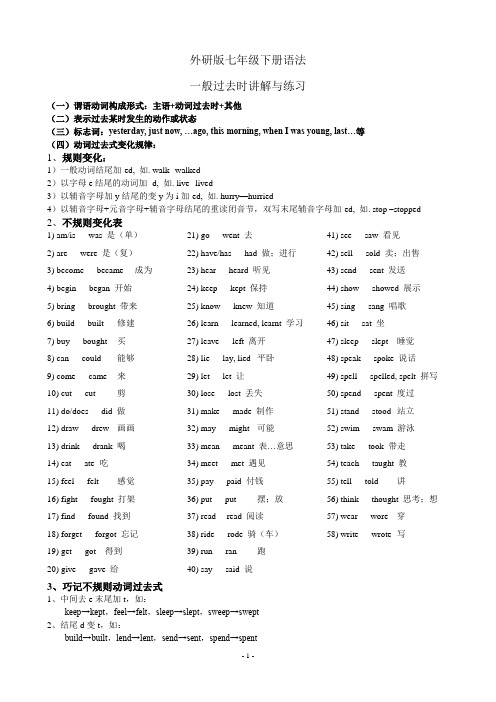
外研版七年级下册语法一般过去时讲解与练习(一)谓语动词构成形式:主语+动词过去时+其他(二)表示过去某时发生的动作或状态(三)标志词:yesterday, just now, …ago, this morning, when I was young,last…等(四)动词过去式变化规律:1、规则变化:1)一般动词结尾加-ed, 如. walk--walked2)以字母e结尾的动词加- d, 如. live--lived3)以辅音字母加y结尾的变y为i加-ed, 如. hurry—hurried4)以辅音字母+元音字母+辅音字母结尾的重读闭音节,双写末尾辅音字母加-ed, 如. stop –stopped 2、不规则变化表1) am/is --- was 是(单)2) are --- were 是(复)3) become --- became 成为4) begin --- began 开始5) bring --- brought 带来6) build --- built 修建7) buy --- bought 买8) can --- could 能够9) come --- came 来10) cut --- cut 剪11) do/does --- did 做12) draw --- drew 画画13) drink --- drank 喝14) eat --- ate 吃15) feel --- felt 感觉16) fight --- fought 打架17) find --- found 找到18) forget --- forgot 忘记19) get --- got 得到20) give --- gave 给21) go --- went 去22) have/has --- had 做;进行23) hear --- heard 听见24) keep --- kept 保持25) know --- knew 知道26) learn --- learned, learnt 学习27) leave --- left 离开28) lie --- lay, lied 平卧29) let --- let 让30) lose --- lost 丢失31) make --- made 制作32) may --- might 可能33) mean --- meant 表…意思34) meet --- met 遇见35) pay --- paid 付钱36) put --- put 摆;放37) read ---read 阅读38) ride --- rode 骑(车)39) run --- ran 跑40) say --- said 说41) see --- saw 看见42) sell --- sold 卖;出售43) send --- sent 发送44) show --- showed 展示45) sing --- sang 唱歌46) sit --- sat 坐47) sleep --- slept 睡觉48) speak --- spoke 说话49) spell --- spelled, spelt 拼写50) spend --- spent 度过51) stand --- stood 站立52) swim --- swam 游泳53) take --- took 带走54) teach --- taught 教55) tell --- told 讲56) think --- thought 思考;想57) wear --- wore 穿58) write --- wrote 写3、巧记不规则动词过去式1、中间去e末尾加t,如:keep→kept,feel→felt,sleep→slept,sweep→swept 2、结尾d变t,如:build→built,lend→lent,send→sent,spend→spent3、遇见i改为a,如:ring→rang,sit→sat,drink→drank,sing→sang,swim→swam,begin→began,give→gave4、“骑(马)”“开(车)”“写(字)”——把i变o如:ride→rode,drive→drove,write→wrote5、“想”“买”“带来”“打仗”——ought换上,如:think→thought,buy→boug ht,bring→brought,fight→fought6、“教书”“抓住”——aught切莫忘,如:teach→taught,carry→caught7、ow/aw改为ew是新时尚,如:know→knew,grow→grew,throw→threw,draw→drew8、“放”“让”“读”过去式与原形一个样,如:put→put,let→let,read→read/red/(五)否定句:1、动词be过去式后直接加notEg. I was not in Chengdu last year.2、当是实义动词时,加助动词didn’t后跟动词原形Eg. I didn’t telephone my parents yesterday.(六)一般疑问句:1、动词be过去式提前Eg. Were you in Chengdu last year?2、当是实义动词时将助动词did 放在前面,后跟主语和动词原形Eg. Did you telephone my parents yesterday?(七)特殊疑问句:特殊疑问词+一般疑问句练习:I:将下列动词变为过去式(规则动词和不规则动词)1.look2.live3.stop4.carry5.hope6.trip7.call8.finish9.want 10.are11.go 12.have 13.do 14.get e16.say 17.see 18.put 19.eat 20.take21.read 22.catch 23.listen 24.arrive 25.planII:句型转换1、他曾是一名学生。
外研版七年级下册英语语法复习:一般过去时 知识点与练习题(含答案)

外研版七年级下册英语语法复习:一般过去时知识点与练习题导入→I met him yesterday.定义:一般过去时表示过去某个时间里发生的动作或状态;过去习惯性、经常性的动作、行为。
在英语语法中,“时“指动作发生的时间,”态“指动作的样子和状态注意:用一般过去时的时候,要表示“过多少时间之后”一般用after,不用in 如:Tom suddenly fel ill yesterday Tom 昨天突然生病了。
She didn't look well when i lat saw her.我上次看见她的时候,她脸色不好2.一般过去时也可与today,this week,this month ,this year 等时间状语连用。
但是这些时间状语必须指过去,决不包括“现在”在内如:Did you see him today?今天你见过他了吗?(today实际上指的是今天的过去某一时刻)3.一般过去时虽不可以与now连用,但却可以和just now(刚才)连用。
如:He went out just now他刚出去了4.一般过去时表示过去的时候还有以下一些情况①:用于since从句,主句的谓语动词如果用现在完成时。
其后接的since引导的从句一般须用一般过去时如:It's been over a year since i came back from the countryside我从乡下回来已经一年了(主句的谓语动词has been 也可以改为is 但美国英语多用现在完成时)②:时间状语可以省略,前面说过一般过去时常与表过去的时间状语连用,但下面一些情况下,时间状语可以省略---从上文可以清楚地看出来时间状语如:Did you sleep well?---前文如有现在完成时所引导时如:I have been within an inch of life ,and didn't know it!---和现在时态对比时候如:He is no longer the man he was---有表示过去习惯的used to 时候如:I used to play football in the street③:所表的动作已经完成如:I read a book last week上星期我读了一本书④:表示死者的动作和状态。
外研版英语英语一般过去时练习含解析百度文库

外研版英语英语一般过去时练习含解析百度文库一、初中英语一般过去时1.John ________ his grandma every day when she was in hospital.A. visitedB. was visitingC. visitsD. is visiting【答案】 A【解析】【点评】句意:奶奶住院时,约翰每天去看她。
奶奶住院是过去的状态,在这期间发生的约翰每天看望奶奶的动作指的是过去经常反复发生的动作,用一般过去时态,动词用过去式。
故选A。
2.-Have you finished your homework?-Yes, I have. I it this morning.A. finishB. finishesC. finishedD. have finished【答案】C【解析】【分析】句意:你完成你的作业了吗?——是的,我完成了。
我今天早晨完成的。
结合语境可知下文描述的是过去某时发生的动作,故用一般过去时态。
选C。
【点评】英语中的时态主要是借助于时间状语与上下文语境来进行判断。
解答此类题型,首先要注意句子中的时间状语,如果没有则要通过分析上下文,结合语境来判断句子的时态。
英语疑问句中一般具有时态上的对应关系,注意结合这一特点进行区分。
3.The old man _________________ Bajin was a famous writer.A. was calledB. is calledC. calledD. calls【答案】 C【解析】【分析】句意:老人巴金是一位著名的作家。
谓语动词是was,故此处缺少非谓语动词,call与man是被动关系,故是过去分词用后置定语,故选C。
【点评】考查非谓语动词,注意过去分词的用法。
4.Mr Zhang and his wife _______to the party last Sunday。
()A. invitedB. was invitedC. were invited【答案】 C【解析】【分析】句意:上周星期天请的张先生和妻子参加晚会。
外研版英语英语一般过去时技巧(很有用)及练习题含答案解析百度文库

外研版英语英语一般过去时技巧(很有用)及练习题含答案解析百度文库一、初中英语一般过去时1.—Sorry, I your dictionary yesterday.—It doesn't matter.A. took; by handB. took; by mistakeC. got; by accidentD. brought; in this way【答案】 B【解析】【分析】句意:——抱歉,昨天我由于差错拿走了你的字典。
——没关系。
yesterday昨天,和一般过去时连用,take:带走,bring:带来,get:得到,by mistake:由于差错,by hand:手工,in this way:以这种方式,根据句意可知答案,故选B。
【点评】考查动词的时态,辨析和短语。
根据语境判断句意,选出恰当的选项。
2.Mr Zhang and his wife _______to the party last Sunday。
()A. invitedB. was invitedC. were invited【答案】 C【解析】【分析】句意:上周星期天请的张先生和妻子参加晚会。
表示上周星期天发生的过去动作,用一般过去时态;主语Mr Zhang and his wife是谓语动词invite的承受者,用被动语态,主语Mr Zhang and his wife表示复数合义。
故选C。
3.He_________ me his name, but I can't remember it now.A. tellsB. will tellC. toldD. is telling【答案】 C【解析】【分析】句意:他告诉我他的名字,但我现在记不起来了。
根据下文but I can't remember it now.可知以前告诉过我,要用一般过去时,tell的过去式told,故选C。
【点评】考查一般过去时的构成和用法。
外研版英语七年级英语句型及语法(英语一般过去时)含答案解析
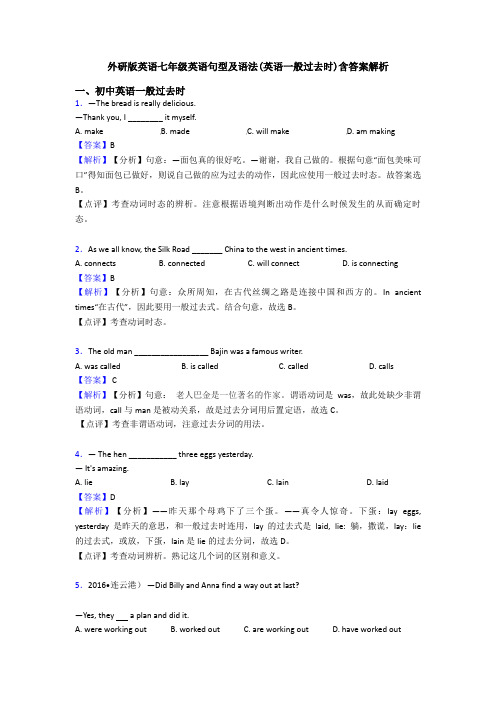
外研版英语七年级英语句型及语法(英语一般过去时)含答案解析一、初中英语一般过去时1.—The bread is really delicious.—Thank you, I ________ it myself.A. makeB. madeC. will makeD. am making【答案】B【解析】【分析】句意:—面包真的很好吃。
—谢谢,我自己做的。
根据句意“面包美味可口”得知面包已做好,则说自己做的应为过去的动作,因此应使用一般过去时态。
故答案选B。
【点评】考查动词时态的辨析。
注意根据语境判断出动作是什么时候发生的从而确定时态。
2.As we all know, the Silk Road _______ China to the west in ancient times.A. connectsB. connectedC. will connectD. is connecting【答案】B【解析】【分析】句意:众所周知,在古代丝绸之路是连接中国和西方的。
In ancient times“在古代”,因此要用一般过去式。
结合句意,故选B。
【点评】考查动词时态。
3.The old man _________________ Bajin was a famous writer.A. was calledB. is calledC. calledD. calls【答案】 C【解析】【分析】句意:老人巴金是一位著名的作家。
谓语动词是was,故此处缺少非谓语动词,call与man是被动关系,故是过去分词用后置定语,故选C。
【点评】考查非谓语动词,注意过去分词的用法。
4.— The hen ___________ three eggs yesterday.— It's amazing.A. lieB. layC. lainD. laid【答案】D【解析】【分析】——昨天那个母鸡下了三个蛋。
——真令人惊奇。
外研版英语初一 英语一般过去时填空练习题附解析百度文库

外研版英语初一英语一般过去时填空练习题附解析百度文库一、初中英语一般过去时1.—Have you ever been to Shanghai?—Of course. Actually, I _________there for six years but now I live in Taizhou.A. workedB. was workingC. would workD. have worked【答案】 A【解析】【分析】句意:——你去过上海吗?——当然。
事实上,我在那里工作了六年,但是现在我住在泰州。
根据答语 but now I live in Taizhou. 但是现在我住在泰州,可知在上海工作为过去发生的事情,时态应用一般过去时,work的过去式为worked,故选A。
【点评】考查一般过去时。
注意根据时间状语判断句子的时态,选择正确答案。
2.As we all know, the Silk Road _______ China to the west in ancient times.A. connectsB. connectedC. will connectD. is connecting【答案】B【解析】【分析】句意:众所周知,在古代丝绸之路是连接中国和西方的。
In ancient times“在古代”,因此要用一般过去式。
结合句意,故选B。
【点评】考查动词时态。
3.A bridge ________over the river last year.A. buildsB. builtC. was builtD. is built【答案】 C【解析】【分析】句意:去年河上建了一座桥。
主语是谓语的执行者时,用主动语态,主语是谓语的承受者时,用被动语态。
a bridge是谓语build的承受者,用被动语态;表示在last year发生的过去动作,用一般过去时态,故选C。
4.—I am sorry I _______ my exercise book at home.— Don't forget _______ it to school tomorrow.A. forget; to takeB. left; to bringC. forgot; to bringD. left; to take【答案】A【解析】【分析】forget忘记;leave留下;bring带来;take带走。
- 1、下载文档前请自行甄别文档内容的完整性,平台不提供额外的编辑、内容补充、找答案等附加服务。
- 2、"仅部分预览"的文档,不可在线预览部分如存在完整性等问题,可反馈申请退款(可完整预览的文档不适用该条件!)。
- 3、如文档侵犯您的权益,请联系客服反馈,我们会尽快为您处理(人工客服工作时间:9:00-18:30)。
外研版七年级下册语法一般过去时讲解与练习(一)谓语动词构成形式:主语+动词过去时+其他(二)表示过去某时发生的动作或状态(三)标志词:yesterday, just now, …ago, this morning, when I was young,last…等(四)动词过去式变化规律:1、规则变化:1)一般动词结尾加-ed, 如. walk--walked2)以字母e结尾的动词加- d, 如. live--lived3)以辅音字母加y结尾的变y为i加-ed, 如. hurry—hurried4)以辅音字母+元音字母+辅音字母结尾的重读闭音节,双写末尾辅音字母加-ed, 如. stop –stopped 2、不规则变化表1) am/is --- was 是(单)2) are --- were 是(复)3) become --- became 成为4) begin --- began 开始5) bring --- brought 带来6) build --- built 修建7) buy --- bought 买8) can --- could 能够9) come --- came 来10) cut --- cut 剪11) do/does --- did 做12) draw --- drew 画画13) drink --- drank 喝14) eat --- ate 吃15) feel --- felt 感觉16) fight --- fought 打架17) find --- found 找到18) forget --- forgot 忘记19) get --- got 得到20) give --- gave 给21) go --- went 去22) have/has --- had 做;进行23) hear --- heard 听见24) keep --- kept 保持25) know --- knew 知道26) learn --- learned, learnt学习27) leave --- left 离开28) lie --- lay, lied 平卧29) let --- let 让30) lose --- lost 丢失31) make --- made 制作32) may --- might 可能33) mean --- meant 表…意思34) meet --- met 遇见35) pay --- paid 付钱36) put --- put 摆;放37) read ---read 阅读38) ride --- rode 骑(车)39) run --- ran 跑40) say --- said 说41) see --- saw 看见42) sell --- sold 卖;出售43) send --- sent 发送44) show --- showed 展示45) sing --- sang 唱歌46) sit --- sat 坐47) sleep --- slept 睡觉48) speak --- spoke 说话49) spell --- spelled, spelt拼写50) spend --- spent 度过51) stand --- stood 站立52) swim --- swam 游泳53) take --- took 带走54) teach --- taught 教55) tell --- told 讲56) think --- thought 思考;想57) wear --- wore 穿58) write --- wrote 写3、巧记不规则动词过去式1、中间去e末尾加t,如:keep→kept,feel→felt,sleep→slept,sweep→swept2、结尾d变t,如:build→built,lend→lent,send→sent,spend→spent3、遇见i改为a,如:ring→rang,sit→sat,drink→drank,sing→sang,swim→swam,begin→began,give→gave4、“骑(马)”“开(车)”“写(字)”——把i变o如:ride→rode,drive→drove,write→wrote5、“想”“买”“带来”“打仗”——ought换上,如:think→thought,buy→boug ht,bring→brought,fight→fought6、“教书”“抓住”——aught切莫忘,如:teach→taught,carry→caught7、ow/aw改为ew是新时尚,如:know→knew,grow→grew,throw→threw,draw→drew8、“放”“让”“读”过去式与原形一个样,如:put→put,let→let,read→read/red/(五)否定句:1、动词be过去式后直接加notEg. I was not in Chengdu last year.2、当是实义动词时,加助动词didn’t后跟动词原形Eg. I didn’t telephone my parents yesterday.(六)一般疑问句:1、动词be过去式提前 Eg. Were you in Chengdu last year2、当是实义动词时将助动词did 放在前面,后跟主语和动词原形Eg. Did you telephone my parents yesterday(七)特殊疑问句:特殊疑问词+一般疑问句练习:I:将下列动词变为过去式(规则动词和不规则动词)eII:句型转换1、他曾是一名学生。
肯定句 He a student.否定句 He a student.一般疑问句 he a student肯定回答, .否定回答, .1、他们昨晚开了一个会。
肯定句They had a meeting last night.否定句They a meeting last night.一般疑问句 they a meeting last night肯定回答, .否定回答, .提问: they last night过去时专项练习I:用所给词的适当形式填空。
1. Tom and Mary ___________ (come) to China last month.2. Mike _________________(not go) to bed until 12 o’clock last night.3. Mary __________ (read) English yesterday morning.4. There _________ (be) no one here a moment ago.5. I ___________ (call) Mike this morning.6. I listened but ___________ (hear) nothing.7. Tom ___________ (begin) to learn Chinese last year.8. Last week we _________ (pick) many apples on the farm.9. My mother ________________ (not do) housework yesterday.10. She watches TV every evening. But she _________ (not watch) TV last night.11.________ your father ________ ( go ) to work every day last year12. What time _______ you _______ (get) to Beijing yesterday13. What __________ (make) him cry (哭) just now14. Last year the teacher _________ (tell) us that the earth moves around the sun.15. There ____________( be not) any hospitals in my hometown (家乡) in 1940.16. ---When _______ you _________ (come) to china ---Last year.17. ???????????she ________ (have) supper at home18. Jack ____________ (not clean) the room just now.19. _________ (be) it cold in your city yesterday20. How many people ________ (be) there in your class last term21. It ________ (be) hot yesterday and most children _______ (be) outside.22. There ________ (be) a football match on TV yesterday evening, but I _________ (have) no time to watch it.II:按要求变换句型。
1. Father bought me a new bike. (否定句)2. Frank read an interesting book about history. (一般疑问句)3. He cleaned his rooms last weekend. (划线提问)4. Thomas spent RMB 10 on this book. (否定句)5. My family went to the beach last week. (划线提问)6. Did you go to the Great Wall with your friends last year (改为肯定句)7. They didn’t saw the picture on the wall. (改为肯定句)。
